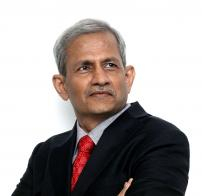[Busan port, South Korea. AI runs most of the functions of the port, one of the largest in the world. Despite huge traffic, it is known as a ‘zero-delay’ port. Photo from Busan Port Authority]
Before you read this article, go to YouTube and look up the Eternity Korean pop group channel—also known as ‘IIternity’. Play a video titled DTDTGMGN. You'll see two female singers on the screen. They look like college students. They dance, change their costumes frequently, sing. Their mischievous facial expressions keep you glued to the video. They are very popular with more than 6 million views. There are many other videos on the Eternity channel. Almost all female singers in the band are popular in many parts of the world. One band member, Zae-in, can both sing and dance. She is also a fashion designer.
But here’s the twist: this band does not perform on stage. You cannot ask the band members to sign an autograph or stand next to you for a photograph. You can only see them in videos. They look like any girl you may meet in a college in Seoul or Incheon, just a bit smarter than most girls of their age.
Eternity is a band created by AI. The characters appear human but they are robots. This is not a recent invention. The band has been around for over five years.
While the world is talking about AI in China and the United States, South Korea is creating a very novel kind of AI. The Korean port of Busan is one of the largest in the world. It handles 20 million containers every year. Despite huge traffic, it is known as a ‘zero-delay’ port. AI runs most of the functions of the port. If a typhoon is detected heading toward Busan, AI systems reroute shipments to inland logistics centres, reschedule dockings, and alert clients. This happens within seconds. The media talks about Elon Musk’s self-driving cars. Busan has self-driving trucks and automatic cranes that handle many of the loading functions.
I recently met Byoung Tak-Zhang of Seoul National University in a coffee queue at Shanghai University. He looked like a very unassuming professor. He turned out to be a prominent AI scientist. He is a pioneer in making a robot that takes care of a mother’s functions. The robot can wake up the child and prepare her for school. Many working Korean mothers are very happy. But Byoung is not satisfied with this achievement. He told me that his ambition was to create Artificial General Intelligence (AGI) where there will be hardly any difference between AI and humans. He is not talking about the singers of Eternity band. They are products of a deep learning company called Pulse. Their actions and responses are programmed. He is trying to create robots than can absorb information from the environment around them, think and act.
When we talk about AGI, we mostly think of Open AI, Google, and other American companies. But South Korea is advancing fast in this direction.
The South Korean public leaders are aware of the dangers of AGI if the country is not careful. Byoung was with a group of Korean scientists and thought leaders. One of them was Kim Won-soo. He is a highly respected South Korean diplomat. He was also the Under Secretary General of the United Nations. He told me that he was very worried about unintended dangers posed by advanced AI systems that may turn out to be smarter than humans. It can lead to an existential crisis of humanity, just like nuclear weapons or climate change.
Choi Kyoungjin is leading efforts to make sure that AI behaves within the limits of the law. He heads the Centre for AI Policy at Gachon University. That is his day job. He is the President of South Korea Association for Artificial Intelligence and Law (KAAIL). He is also involved in leading the debate in South Korea on AI law. It is due to his efforts that the newly introduced Basic AI Act of South Korea has a famous Article 35. It puts restrictions on AGI. The law does not use the term AGI since it is not well defined. Instead, it mentions “high-impact systems”. Choi is waiting for the South Korean elections to be over in June. Once the new government settles in, I am sure he will encourage them to be as precise as possible in defining the risks from such advanced systems.
Legal experts like Choi are having success because politicians from all parties are calling for ethical and balanced use of AI. Lee Hai-min, a parliamentarian, made huge efforts to introduce Article 35. He belongs to the Rebuilding Korea Party. Representatives of other parties like the People Power Party and the Democratic Party have been active in promoting responsible AI.
South Korea is an example of how to promote a balanced approach to the future of AI. Scientists like Byong pursuing AGI and legal scholars like Choi pursuing constraints on AI are equally concerned about the future of their society. There is a healthy debate in the country on benevolent as well as risky dimensions of this technology. The rest of the world will benefit by watching how the governance of AI evolves in this country.


